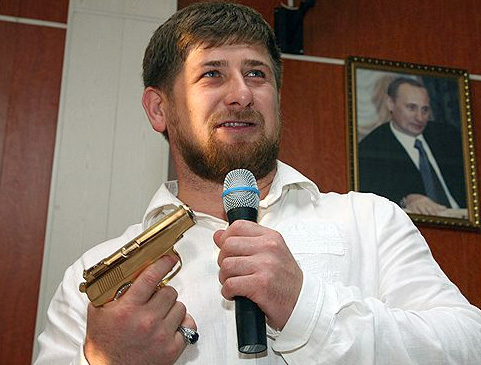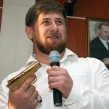
Chechen Exiles Reportedly Live in Fear of Kadyrov’s Agents
Publication: Eurasia Daily Monitor Volume: 7 Issue: 216

The father of Umar Israilov, the former bodyguard of the Chechen President, Ramzan Kadyrov, who was murdered in Vienna in January 2009 after accusing Kadyrov of torture and giving evidence against him to the European Court of Human Rights, is expected to testify today (October 3) in a Vienna court at the trial of three men accused of killing Israilov. According to the Kavkazsky Uzel (Caucasian Knot) website, it is expected that Sharpudi Israilov, who spent about a year in a secret prison in Chechnya after being incarcerated by Chechen authorities trying to force his son to return to the republic, will tell the court about those prisons in Chechnya and name the people who tortured him (www.kavkaz-uzel.ru, December 3).
Umar Israilov, a former Chechen insurgent, was captured in Chechnya in 2003 and held at a secret prison in Chechnya. He claimed he was personally tortured by Ramzan Kadyrov and forced to join the Chechen leader’s forces. He escaped a year later, after which Kadyrov’s forces abducted his father and held him in prison for nearly a year in order to compel Umar Israilov to return to Chechnya. Umar Israilov subsequently received asylum in Austria (www.hrw.org, November 12).
The trial of three suspects accused in Israilov’s murder –Turpal-Ali Yershukaev, Suleiman Dadaev and Otto Kaltenbrunner– began last month. Kaltenbrunner, a Chechen native who changed his name after arriving in Austria in 2007, is accused of ordering the January 19, 2009, shooting of Israilov in the Austrian capital, while Dadaev is accused of driving the getaway car. Yershukaev is accused of shooting Israilov along with another Chechen, Lecha Bogatyryov, who is reportedly in Chechnya (www.themoscowtimes.com, November 22). Austrian authorities have issued a warrant for Bogatyrov’s arrest, and he was reportedly spotted in footage aired in mid-September on Russian television showing a meeting held in Grozny to discuss the issue of resolving blood feuds in Chechnya (www.kavkazcenter.com, November 19; www.spiegel.de, November 23).
Kavkazsky Uzel quotes Ektaterina Sokiryanskaya, a member of the International Coalition of Human Rights Organizations from Russia, as saying that the trial of the three men accused in Israilov’s murder is the most sensational trial currently taking place in Austria and is receiving heavy media coverage there. Extensive security measures are being taken at the trial and for Sharpudi Israilov personally (www.kavkaz-uzel.ru, December 3).
Kadyrov has repeatedly denied any connection to the murder of Umar Israilov and claims the accusations of his involvement are politically motivated. Lawyers for Kaltenbrunner last month requested that the Chechen leader be called as a witness and the judge in the trial, Friedrich Forsthuber, suggested that Kadyrov be heard via a video link. At the opening of the trial, prosecutors showed a photo of Kaltenbrunner embracing Kadyrov that was found on Kaltenbrunner’s cell phone (www.themoscowtimes.com, November 22).
However, Kadyrov’s lawyer, Andrei Krasnenkov, was quoted yesterday (December 2) as saying that the Chechen leader will not travel to Vienna to testify in the trial. “He sees no need to travel,” Krasnenkov told Interfax. “He is not involved in this murder. He will not be able to say anything new about it. Questions can be sent to the Chechen prosecutor’s office, and may be answered by Ramzan Kadyrov, if he deems it necessary … His summoning to the court is an attempt to stage a show. This subpoena will only extend the trial.” Kadyrov himself was quoted on November 30 as once again denying any connection to Israilov’s murder. “I have nothing to do with this incident, directly or indirectly,” he told Interfax, adding “This is well known to those who reproduce this lie. By mentioning my name, some are trying to solve their political, party or other problems” (Interfax, December 2).
Meanwhile, Chechen exiles living in Germany (approximately 6,000 Chechens live in Germany) “live in fear of Kadyrov.” Germany’s Der Spiegel reported last month. “Chechen exiles have frequently told German authorities about Kadyrov’s influence in Berlin,” the magazine wrote, adding “The president is apparently determined to convince exiles to return home, if necessary with rough measures. He allegedly has middlemen and agents that he uses specifically for this purpose.”
According to Der Spiegel, the award-winning Chechen poet, Apti Bisultanov, was among the exiles who received an “unwanted visit” from agents of Kadyrov in Berlin. The magazine, citing Chechens in the German capital, reports that these agents try to lure exiles home with promises of jobs but have also threatened violence against the exiles’ relatives who remain in Chechnya. “In the case of Bisultanov, Kadyrov’s men and Russian officials worked hand in hand. Russia had demanded his extradition and was trying to torpedo his application for asylum [in Germany], but was unsuccessful on both counts,” the magazine wrote (www.spiegel.de, November 16).




